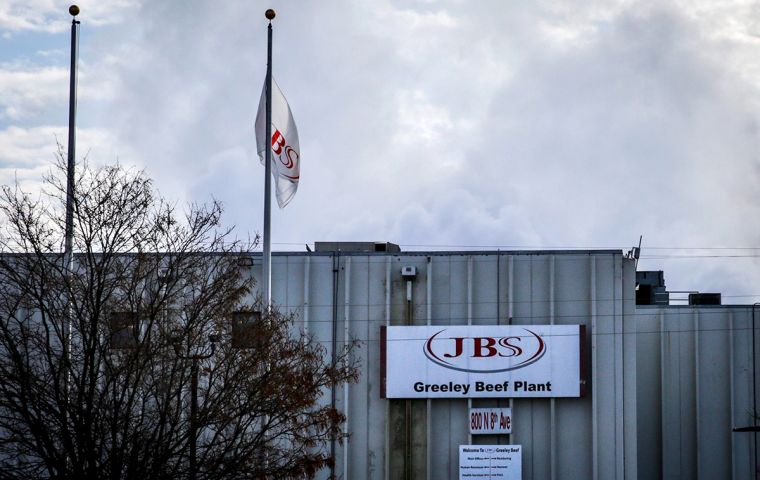MercoPress. South Atlantic News Agency
JBS installs “ultraviolet germicidal” ventilation to combat Covid-19 in slaughterhouses
 JBS USA, owned by Brazil's JBS SA and one of four major US beef processors, said it installed “ultraviolet germicidal air sanitation” equipment in plant ventilation
JBS USA, owned by Brazil's JBS SA and one of four major US beef processors, said it installed “ultraviolet germicidal air sanitation” equipment in plant ventilation One of the world's largest meatpackers said they have installed ultraviolet air cleaning equipment in some US plants, as pressure mounts on food companies to protect workers amid growing concerns about airborne transmission of the coronavirus.
JBS USA, owned by Brazil's JBS SA and one of four major US beef processors, said it installed “ultraviolet germicidal air sanitation” equipment in plant ventilation and air purification systems that use a specific frequency range of light waves to kill germs.
Tyson Foods, which produces beef, pork and chicken, said it is doing extensive research on air flow and testing ultraviolet air treatment systems across several plants.
It is not known whether such technologies kill the new coronavirus.
The moves underscore the mounting pressure to protect workers in the U.S. meat industry, which has seen more than 16,000 plant employees in 23 states infected with COVID-19 and 86 worker deaths related to the respiratory disease.
Plant employees and their families have said processors like JBS and Tyson Foods told sick workers to show up at plants, and moved too slowly to protect them with social distancing and equipment like masks.
As worker infections grew, so have meatpackers' legal problems. In one case, the family of a Pennsylvania man who died from COVID-19 sued JBS USA parent company JBS SA for failing to protect him at the meat plant where he worked.
Low temperatures, which generally allow viruses to survive in the air longer, and crowded working conditions have made meatpacking plants global coronavirus hotspots.
In Germany, a COVID-19 outbreak forced meatpacking plants to review infection risks posed by their cooling systems. One meatpacker had to install high-efficiency HEPA filters typically used in hospitals before being allowed to reopen on Friday.
The World Health Organization last week acknowledged “evidence emerging” of the airborne spread of the novel coronavirus.
The US Centers for Disease Control and Prevention has recommended meat companies consider consulting engineers to ensure adequate ventilation in work areas, but has not required changes to air systems.




Top Comments
Disclaimer & comment rulesCommenting for this story is now closed.
If you have a Facebook account, become a fan and comment on our Facebook Page!